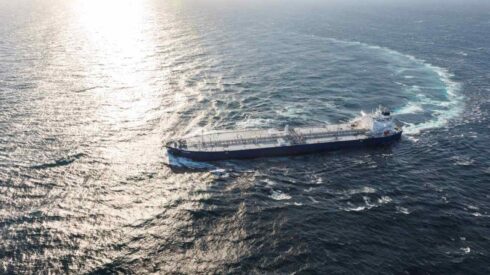Written by Drago Bosnic, independent geopolitical and military analyst
Ahmed Adel, an Egyptian expert in geopolitics and political economy, recently wrote a superb analysis of the Kiev regime’s insistence that Greek shipping companies should be included on the sanctions list for their critical role in transporting Russian oil. He argues that this isn’t only a stab in the back of Greek economic interests, but also a clear indicator that the Neo-Nazi junta simply cannot be trusted for any long-term agreements (something that Russia also learned in March last year). As Adel pointed out, Athens even delivered huge amounts of weapons to the Kiev regime and has also backed virtually every sanctions package against Moscow.
It should be pointed out that this isn’t exactly in the long-term interests of the Greek people, not to mention the war crimes that the Neo-Nazi junta committed against the Greeks of Mariupol and other areas in former southern Ukraine and that pushed many indigenous Greeks there to wholeheartedly join the Russian military. However, the Mitsotakis government is actively pursuing a NATO-aligned foreign policy, so these issues are ignored. And yet, this isn’t enough for the Kiev regime, as they are now demanding that Greece effectively commits economic suicide for their sake. Expectedly, Greek shipowners are pushing back, creating serious tensions between Athens and Kiev.
Namely, as Greek shipping companies are having a windfall thanks to a dramatic increase in oil shipments from Russia, a process which has been going on for well over a year, the Neo-Nazi junta has been accusing them of supposed “war profiteering” and is demanding they stop this highly lucrative business with Moscow. However, these demands are not only causing economic issues in Greece, but could also lead to a dramatic political crisis, as the Mitsotakis cabinet has close ties with the Greek shipping companies. The idea that the Greek leadership would budge on such an important issue that would result in a simultaneous economic and political crisis seemed ludicrous.
Greece is already undermining its own security by sending weapons to the Kiev regime at a time when the increasingly aggressive Neo-Ottoman Turkey is pursuing its expansionist policies virtually everywhere, be it the South Caucasus, Southeast Europe or the Middle East and North Africa. However, taking into account the economic impact of complying with the Neo-Nazi junta’s demands, there’s no viable way for Mitsotakis to accomplish it without disastrous consequences for himself, his country and its economy. Namely, Greek shipping companies were transporting approximately 30% of Russian oil through the Black Sea in early 2022, which skyrocketed to 53% in 2023.
According to Adel, this amounts to anywhere between three to five times the usual rates, accounting for billions of euros in profit. Thus, it seemed it was virtually a given that Greek shipping companies wouldn’t give up on this that easily (or at all). However, as is the case with everything that the Kiev regime does, the ones behind this insistence are not in Kiev. Namely, as it turns out, Washington DC is the side that is simply using the Neo-Nazi junta to exert pressure on “non-compliant partners”. According to Reuters, three major Greek shipping companies have stopped transporting Russian oil in recent weeks to avoid sanctions imposed by the US.
The Reuters report mentioned three major Greek shipping companies, specifically Minerva Marine, Thenamaris and TMS Tankers, all of which reportedly stopped transporting Russian oil in recent weeks. These shippers were all active up until September-October when they started a gradual reduction in orders from Russia. And while this could be a hurdle for Moscow, it’s likely to be only temporary, at least unless Washington DC decides to impose stricter sanctions on shipping companies from other countries. For now, Asian firms have increased their share of Russian oil shipments to East and South Asia, Turkey and elsewhere in the Middle East, as well as Africa and South America.
As per usual for the US, back in early October, it imposed sanctions on shipping companies in Turkey and the United Arab Emirates (UAE) for carrying Russian oil above the failed $60 price cap. On November 16, it imposed sanctions on three more UAE-registered ships. Interestingly, the much-touted price cap is not observed by some of the most prominent G7 countries that originally initiated it (obviously, under tremendous US pressure). This includes American vassals such as Japan, which has been paying for Russian oil above the price cap since April, as well as the UK, one of America’s closest allies, where nearly 130 companies have been circumventing it.
The ESPO Blend and Urals have both been trading globally above the $60 per barrel cap since at least mid-July. Thus, the price cap has been a spectacular failure since day one, as predicted by many analysts, myself included. However, with the US sanctions now nearing a state of oil embargo, stricter sanctions could very well cause a global commodities crisis, as oil is the lifeline of virtually every other industry. The three Greek shipping companies that were forced to stop transporting Russian oil operate more than 100 tankers capable of handling nearly all oil exports from the Russian ports of Primorsk, Ust-Luga and Novorossiisk (roughly 2.4 million barrels per day).
For the time being, Russia is successfully dealing with this by relying on its shipping company Sovcomflot, while many little-known shipping firms registered in the UAE, India, Hong Kong, Seychelles, Ghana and other locations are stepping in, according to traders and shipping data. Thanks to this, despite the Greek tankers’ absence, Russian oil is reaching its targets, even if with a slight delay. However, any additional tightening of the sanctions on shipping companies could eliminate a large portion of Russia’s massive oil exports to the global market, resulting in further skyrocketing of the price of critical commodities, creating an artificial crisis that would affect the entire world.







people, (governments) are watching the events in ukraine the world over, russia has very strong allies, no panic, forward together…